Premium Only Content
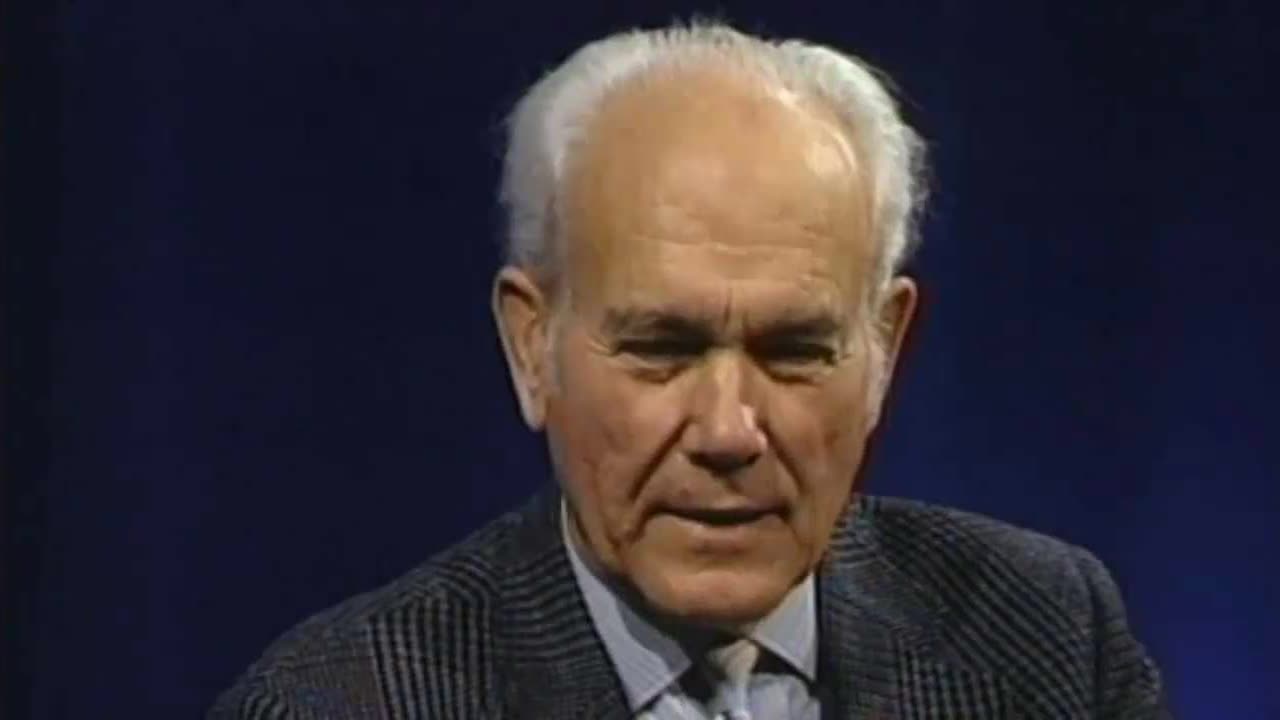
L. Fletcher Prouty 1992 Interview At The National Press Club
The following is from a 1992 interview at the National Press Club
Q: Do you know of any CIA involvement in the deaths of RFK and Martin Luther King?
Prouty: Well, you couldn’t answer those questions—nobody could honestly, because it doesn’t work that way. The involvement that is significant is the involvement and suppression of normal court procedures that any dead body is required to receive. What that means is, a murder committed in the State of Texas must be tried as murder in the State of Texas. If that’s not being done, the power that keeps that from being done is so enormous that that’s where the problem is. And you don’t identify that as either CIA or the Ku Klux Klan. But the power that can keep the State of Texas from carrying out a law, that is, carrying out a law, in every other murder case, because it’s a law, is enormous. And whoever wants to define that power, then, is going to get to the heart of the matter.
Everything else is irrelevant because on 29 November, 1963, Lyndon Johnson met with the attorney general of the State of Texas, by the name of Waggoner Carr. Right after that, he met with J. Edgar Hoover, and in his hand, when he met with J. Edgar Hoover, he had a list of names that he was going to announce that afternoon as being the Warren Commission, but he wanted Hoover to take one last look at it—and Hoover had come in with his records—declaring that all these people were cleared to operate on such a commission, which Hoover did; with one exception—General [Lauris] Norstad—General Norstad was on the list, somehow Norstad was able to get himself removed, I don’t think he wanted to be on it, it had nothing to do with Hoover.
The meeting with Waggoner Carr, coming as it did, what he undoubtedly explained to Carr was “Look, in the case of the death of the President, we’re going to have this commission, I’m not going to have Congress investigate it, I’m going to appoint this top commission to investigate it”; and he probably told Carr “knock off this murder trial indefinitely, until we get this commission.” It couldn’t have been otherwise, it’s conjecture, still it couldn’t have been otherwise. And then, since then, I mean, that’s the President getting involved, now, and since then, there’s never been a trial in the State of Texas. There’s where the power is. There’s no other way to define it.
I traveled, believe me, you may have seen it written—I have travelled to another country to talk with a person, who, at the time Bobby Kennedy was killed, was standing eight or ten inches behind him and he had stopped, more or less, for some cameramen who were in the way in that little doorway. So, this person kind of bumped him, and at that moment, a gun went off in this person’s right ear, and the bullet went behind Bobby Kennedy’s right ear, and killed him. Well, this person was so close the gun caused serious trouble in the right ear by the explosion. This person was never called as a witness, never asked about this or anything, and I saw the person in a foreign country, but if the court case in Los Angeles was as ineffective as the no-court case in Texas—I assume both are somehow related; it doesn’t do any good to try to figure out all the minor details of something like that.
It’s the very obvious top-level of things that are not even done, I mean a real court case. It would be ridiculous for someone to say who has that power, but it’s pretty high up if it can keep a state from doing its required trial. And conversely, it couldn’t be Castro or Khrushchev or the Mafia, they don’t control the government of the State of Texas; at least I don’t think they do. [This] removes a lot of these things they say other people were involved. How would those other people have anything to say about the State of Texas? Now, maybe they do, but we’re a long way down the road if that’s true.
Q: Let’s switch gears a little bit and go to the Rockefeller organization; I know we’re opening up a broad kettle of fish here with the Trilateral Commission, the Council on Foreign Relations and Chase Manhattan Bank and so forth, but is the Rockefeller organization really the bunch of ‘Black Hats’, so to speak, as it’s recently been painted to be?
Prouty: Rockefeller begins with old John D. and he started selling oil that came out of the ground in Texas and Pennsylvania. He realized that something that came out of the ground for practically nothing and then sold for quite a bit more was a pretty good business; and he began to make deals with the railroads. He arranged things for his company and made a lot of money. Then, he sent some scientists to Geneva to have the chemical side of the world declare that oil was an organic matter, therefore, was probably the … actually the product of the decomposition of formerly living matter. This process sort of proved to people that oil was in short supply. Like gold and silver, he created the fiction that oil had intrinsic value. And, therefore, had a right to sell it for a lot of money when, really, it was worth about the same as a bucket of water.
Well, it may not seem like much, but upon that, they built this enormous organization called Standard Oil which was so big the government had to break it down. But, in breaking it down, that’s paper work, just like breaking down the telephone company. And they pretty much stayed together, plus, the fact, that by that time, he had bought control of one of the biggest banks in New York, had that control. And then Rockefeller interests lost no time in acquiring the reserves of oil—major reserves all over the world. One reason they did that is that they remained to be reserves and not above ground; leave ‘em down there. The biggest oil known to exist in the world today is under the city of Bagdad and it’s owned by the Rockefellers from a franchise they placed on it years and years ago.
Well, you can’t help but realize that in the amount of money that the Rockefeller people control, and the Rockefeller Foundation, that they’re going to have a say about things that go on in the world, it just wouldn’t make sense if you didn’t. And, in the process, the Rockefellers have knocked heads with some pretty powerful people. Nelson Rockefeller, for example, attempted to get Truman to accept the fact that the Cold War should be an economic war, such as we’re in right now, rather than a military one, but George Kennan and his backers wanted it to be a military war; wanted the money to go to the military manufacturers and that sort of thing. The Rockefeller system laid back, but it doesn’t mean they weren’t powerful. In fact, they probably overall figured they could make money on both sides and it didn’t matter how it came out.
Another thing that people don’t seem to recognize is one of the biggest businesses in the country is the beef and cattle business, and the dairy business. Out in Madison, Wisconsin, the Rockefellers have an American Breeders Service, I think it is; [and] the finest bull stock [that] exists in the world [is there] and it’s the old story of natural selection. Everything [there] is computerized. And the semen from that place is put into freezers and into test tubes and big 18-wheeler trucks go all over the United States and deliver that to people with cows, to fertilize their cows. And they have gotten the dairy industry, from cows, we’ll say were giving 10,000 quarts of milk a month / year, up to 40,000. [It] increased the whole production of the dairy herd all over the country and increased the beef production by producing cattle that are ever so much better than ever before; that’s all Rockefeller.
Now, if the Rockefeller organization has the initiatives to do those things with something like [unintelligible] dairy products, oil, you can see that they are going to work themselves in, and in the means they used to control the railroad industry [and] control scientific opinion.
These scientists in Geneva did agree that oil was an organic substance; well of course they did—it’s carbon, hydrogen, and oxygen. But most scientists laugh at that because they know that oil did not come from the decomposition of formerly living matter—oil is an ingredient of the Earth just like any other, rock or water, and things like that. But, from the Rockefeller point of view, it was very important to make people think that it came from a limited supply; the decomposition of matter because that would be a very limited supply. In fact, we’ve used up probably ten times as much oil as ever could have produced anyway by living matter. But they use these devices to produce money and to control business and the world. It’s pretty hard to find an example like that anywhere. In the old days, royalty did that in certain places.
After the defeat of Japan, it was Rockefeller money that moved into Japan to rebuild the economy of Japan, as differentiated from the Marshall Plan that went over to Europe and rebuilt the economy of Germany through federal funds. When you begin to know all those things, plus a lot of others, you just can’t overlook the fact that the influence of the Rockefeller family is enormous, and probably growing every day.
I don’t see, realistically, how can overlook that. I was in the banking business, I knew one of the leading vice-presidents of the Chase Manhattan Bank and we were together developing the computer business in Chase Manhattan Bank. Chase was one of the quickest and most adept at accommodating computers at any bank—Republic Bank in Dallas, First City in Chicago, Bank of America in California; Chase Manhattan got into credit cards early.
Anywhere the name Rockefeller it seems as though brilliant people are there, dedicated people are there, and the Rockefellers lead them. I think it would be foolish not to recognize that the Rockefellers are pulling the strings and making the plans and making things work; and they control things.
Q: Any information on any current CIA mind-control programs like Artichoke or anything else?
Prouty: Oh, no, since I retired I have had very little social interest in the CIA, so I couldn’t …
Q: You’re out of the loop, so to speak.
Prouty: That’s why I retired, I wanted out. Nine years is enough.
Q: The article that you wrote at the end of High Treason, as well as the information you’re coming forward here with me, for back of a better question, why? Why are you coming forward with this information? Is it because you have a feeling that the public has a right to know, or …
Prouty: The article that Harry printed in High Treason, he had for many years. He was [unintelligible] and he was close to some connection that I’m not familiar with and an editor of the Baltimore Sun. The editor of the Baltimore Sun was heaping onto the Kennedy administration the reasons for the buildup in Vietnam for which our part of the party line—things that came out of the Pentagon Papers and sources like that.
And we were just talking and I said “Harry, that’s not true.”
I said “When Kennedy was President, we had in Vietnam, very few fighting men; very few.”
“Well, what about the number 16,000?”
“There’s a big difference between 16,000 and fighting men.”
And I explained all the difference from tables and listing and everything else; I was very familiar with it. Then he called me a couple of days later and he said [unintelligible] will print it if you write a story; he’s open-minded. So I wrote what you see in the back of Harry’s book.
Q: And the editor wouldn’t print it?
Prouty: So, Harry liked it and Harry kept it for years. Meanwhile, he was writing this book and he just figured there had to be somewhere in the book to put it, and he just put it in there and he didn’t tell me until later. Which was all right with me, I had written it for publication anyway. And Harry, being an honest man, sent me a check for it, which I didn’t think he owed me.
But anyway, why I wrote it was simply to try, for him—I knew he was affiliated with Harvard—to be able to speak from documented material that it was not a Kennedy-era buildup that got us into the Vietnam thing. In fact, it was a reversal—it was the difference between NSAM 263, which was the build down, and NSAM 273, which was to buildup.
Even the POW / MIA business goes back to that because a lot of the men who are on the MIA rolls were actually CIA people not military people. They have no records and no way to say who they were. They don’t want to admit they had spies working in Laos. Laotians would hit ‘em immediately if they were trying to find “old John Jones” if he was a spy and we lost him Laos. They wouldn’t want to do that. There’s an awful lot of that, but the rational story which I tried to account for in Harry’s book was in the Kennedy-era we had a lot of people there but they were like running PXs, they were helicopter maintenance people, but non-combatant roles. And that was what Kennedy had put out; we will not have combat men—advisors and maintenance people and so on.
Q: That accounts for the numbers, but at the same time you could’ve been silent about this whole thing.
Prouty: If Harry called me I’d give him the information. I wouldn’t say to you “I’d rather be silent than answer your question.” That didn’t occur to me.
Q: But your candor, Fletch, and your forthrightness can be contrasted rather sharply with a lot of your contemporaries.
Prouty: I don’t have any contemporaries.
Q: I’m not saying peers, I’m saying people who have operated in either the intelligence or covert operations field who have been in a position to know unlike people like [John D.] Marks, [Victor] Marchetti and Philip Agee, and so forth, who have kept their mouths shut. I’m not saying what you’re doing is a bad thing, what I’m saying is …
Prouty: I don’t think it works that way. It never occurred to me that way. For instance, to use a name we all hear about, [Richard] Secord. Secord was either a captain or a major in my day, and his boss was [Heinie Aderholt?] who worked for me. Now, if I wanted something to happen in Thailand, I would ask Aderholt to send some people to Thailand. So Secord goes; now, if he didn’t choose to write about what he did in Thailand, because he did it right up front with some people who knew where he was and what he was doing, that’s a completely different thing. But for me to say what was going on in Thailand, I was in the Pentagon, remote from Thailand, so I write about it purely from I sat, I don’t say I was in Thailand doing this, but I can talk about the project that was in Thailand; I set the people up for it, I sent the airplanes out there, and so on. I look at it completely different and I don’t think there are many people I don’t know, even the guys I dedicated the book to, my buddies, I even serialized their work. When you come right down to it, if I see things in a book somewhere that are absolutely wrong, then I think probably I ought to write a little bit to try to correct [it]. That’s what an awful lot of what I did was.
When I wrote The Secret Team, just a little article for the magazine Washington Monthly, an inconspicuous little magazine. And I wrote that because I had been talking to Derrick [unintelligible] said nobody knows that this exists, nobody knows that we have that. So, I wrote this little article. Before the Washington Monthly came out, before I saw the article in print, two editors came to see me and said “That’s the substance of a book. Will you write a book for us?” People I didn’t ever know, had never … I hadn’t even seen the article, I was surprised. One of them came down with a check in his pocket, the other one came down with a notebook, so I put the check in my pocket, shook hands with him and said “I’ll go home and start writing.” Well, what they were after was just what they could see in that little article, that there is a layer here that makes things happen and everything down below … it tied things together that they couldn’t get any other way. And that’s what put the book out. It never occurred to me that it was anything but an autobiography. So that’s what I did. I’m not a reporter. I’m not a writer. I wasn’t a researcher or a student, I just sat down and wrote what I did and that’s a lot different.
Q: It also contrasts with the classified State secret-type information, the naming of names, that makes, or made, Philip Agee move to Switzerland.
Prouty: He probably went to Switzerland with a ticket bought by CIA. I don’t think he ever left the Agency. I read his stuff very carefully and I don’t think it’s anti-Agency, I think it’s pro-Agency. The same with Ellsberg handing out the Pentagon Papers, that was pro-Agency. The same with Leslie Gelb collecting the Papers, that was pro-Agency. Leslie Gelb now being one the senior guys in the New York Times, that’s pro-Agency. Those things don’t happen.
Q: I’m coming less and less to think that there are actual legitimate accidents or coincidences.
Prouty: I don’t write about Agee and I don’t write about Marchetti because in a way I worked with, hell, I worked with Victor … I just happened to be there in Dulles’s office the day Elder(?) was leaving and John Clark was coming in, and Vic was coming in to help the new guy, John Clark, so I’ve known Vic way back in the halls up there, and he was not a supernumerary by any means but he wasn’t one of the—he wasn’t Des Fitzgerald or something like that—but he was there; he was there all the time and knew what was going on. So, I know exactly the circumstances he was in, and when he writes, he’s been writing very truthfully. I have no problem with it.
But some of the other fellows, when they write, I mention one in the book here because it was kind of fun. Anyway, I’ve got a whole chapter about this guy that wrote an article supposedly explaining the Ellsberg situation, Chester Cooper. Well, it was horrible, pure propaganda. So, just for the hell of it, I wrote it about him and said, look he writes this because he’s trying to cover this up, he writes this because he’s try to cover this up. It’s kind of useful way to present what happened.
The Office of Naval Intelligence is not part of the Navy, really. It’s the most powerful intelligence organization in the country. The CIA has nowhere near the ability, history and individuality, too. The ONI goes back to British groups and to very strong British groups. You can’t match ONI with the Army Intelligence, Air Force intelligence or Central Intelligence, no way. ONI is very separate.
The OSS was under the Joints Chiefs of Staff during WW II, they were not by themselves. Bill Donovan, head of the OSS, took orders. Their work was not intelligence, it was activity, action—they were operational. In some places they were absolutely brilliant. A lot of the action they took was what you might call business oriented rather than military oriented. The contacts they had in Germany were the contacts American business had or American law firms had in Germany. The contacts they had in Hungary were the same way. When they picked up Gehlen at the end of the war they just extended that back into the Ukraine and Eastern Europe. The OSS had a short life but had access into areas that were pretty important, but mainly through their adoption by the British so that when they went to the Jedburgh schools (Operation Jedburgh; The Jedburghs: The Secret History of the Allied Special Forces, France 1944) they were getting pretty good training. But they were still individuals that didn’t have any roots. At the end of the war, Truman and his associates, felt that one of the real problems was that U.S. intelligence was not coordinated and this carried over into Congress. One of the first things Truman did was to abolish the OSS; he saw no value for it. When the OSS was disbanded, it got the businessmen out of the intelligence business, or least, Truman thought it would. What was preserved was an office known as the Office of Policy Coordination (OPC).
OPC was preserved because of agents that couldn’t be cut off and they needed support because their lives depended on it. If you had an agent working in Ukraine he needed support and contact. OPC was put under the direction of Frank Wisner who was the closest associate of Allen Dulles while in Europe from WW II days. Both were active in the OSS. OPC was “technically” under nobody, but the head of the OPC had to be nominated by the State Department and approved by the Defense Department, or vice versa. What it meant was that it was just hanging there trying to keep together some assets and resources and techniques that would have collapsed without protection.
Then, in 1947, at the end of 1947, in November, the National Security Act was passed. The main thrust of that was to create the Defense Department and the National Security Council. A lot of people have ignored this, but under the NSC, they stuck this central coordinating organization. And the only operational word in the law with respect to CIA was “coordination.” The world “collection”—the fundamental benefice of intelligence—doesn’t appear in the law.” This coordination was what they thought they were buying. Walter Bedell Smith, was Eisenhower’s Chief of Staff during the campaign in Europe, and was the first ambassador to Russia after the war, replacing Averell Harriman, who had been the ambassador during the war. When Smith came back from Moscow, and was made the head of the new CIA he told Truman that he wasn’t going to put up with the foolishness of the OPC. He was going to merge it with CIA and run from it then on. That was how the residual of OSS got into CIA.
In 1949, Truman asked Allen Dulles and two other men to study the CIA to find out what was going on over there. Truman must not have realized that Allen Dulles was a speech writer for Thomas E. Dewey and when Truman won the election that ended the Dulles effort to put Dewey in the White House in place of Truman. When Eisenhower became President he put General Bedell Smith in the State Department under John Foster Dulles and made Allen Dulles head of the CIA. You can see the maneuvering on the business side more than anything else. Funny thing about the two Dulles people that most people have discounted is that whenever they travelled around the world giving speeches they did it under the auspices of The World Council of Churches. What that meant is they were getting back in the English business in the area of psychic research and the groups that were involved in that sort of thing, and were promoting that around the world actively. In between jobs in the government that would be the way they travelled. They had government portfolios.
Q: Allen Dulles and John Dulles were both travelling under the aegis of the World Council of Churches … the same Allen Dulles that was on the Warren Commission later on …
Prouty: Same guy.
Q: This is certainly at wild variance with the party line in this country …
Prouty: They were both senior partners at Sullivan & Cromwell, the biggest law firm in the world; the most powerful law firm in the world. Sullivan & Cromwell had enormous business contacts in pre-war Germany, and when the war started, they refused to close their offices and stayed in Germany. John Foster was finally ordered home after Pearl Harbor. That meant that their close up relations with key Germans was hot. So they put Allen Dulles in Geneva to keep up the relationship, calling it an OSS job when it was actually a Sullivan & Cromwell job. That way they just kept the thing going, and the Cold War came out of that.
When Russia finally got back to the Romanian border, on about the 1st of September in 1944, Frank Wisner, working for Dulles, was in Bucharest. What happens is one army leaves and one comes in, the German armies were getting the hell out of there as fast as they could move and there was about a two weeks hiatus between the departure of the Germans and the arrival of the Soviets. The Soviets were coming in slowly. They were looking at everything, organizing everything as they were taking over. They weren’t rushing after the German Army they were taking over forever.
In that two week hiatus, Frank Wisner and a bunch of Nazis and ex-Nazis that he’d been working with, convincing him that there was a future for them, wrapped up all the Bucharest records from the Ukraine, everything the Germans had put together. They were absolutely fabulous and most important records. In order to get them out of Hungary, including the people and Nazis he was working with, and Nazis sympathizers who were Romanians. Wisner took 750 war prisoners, most aircraft crews, and called headquarters and said he needed some Air Force planes to fly them out of there. Instead of planes, Wisner loaded them on a train and carried them across Turkey. The railroad line north of Aleppo, Syria, drops below the border of Turkey and for about 25 or 30 miles it’s two or three miles in Syrian territory.
My boss, a general in Cairo, told me to go up to Aleppo one morning in September of 1944. So we fly up to Aleppo and met with a British major and asked where we could land to meet the train. We went back to Cairo that night, and the general told me to stop every plane coming in, unload them, until you have 37 planes. Be back tomorrow and land next to where the train will be. Prouty took all these transport planes to the designated place where the train was scheduled to stop. The train stopped on the men on the train ran toward the planes parked by the railroad. As each plane was filled it took off.
We brought some nurses with us, and my plane was the VIP plane with comfortable seating and some cots were arranged in the plane. When we got down to the last load, the poor guys were coming either on crutches, one leg, one or two with no legs, and the only reason they lost the legs was that was the way the natives, barbarians, would cut off the leg at the knee rather than put them in prison. They couldn’t run away without legs. I think we had 25 or 30 of these guys plus those standing. Everything was in a hurry, so I took off last with the nurses to take care of the guys that were hurt. On the way down to Cairo, I went back to see how everything was going and realized I had a bunch of guys on the plane that weren’t Americans. I was told all these people were POWs.
We flew to Cairo and the legitimate prisoners were sent right to the hospital. And the other guys just went into thin air. That was the first act of the Cold War. That was the first action by military authorities of the United States against our Russian allies. These were pro-Nazis. Then I began to realize that this element went all the way through Europe. Certain ones realized they were being selected by business contacts to survive the end of the war.
Whether you noticed or not, the foreign minister of Germany at the end of Hitler’s days was a man named Lutz Graf Schwerin von Krosigk. Lutz von Krosigk made a speech on the 3rd of May 1945, before the German surrender, he made a speech in which he said that the world should recognize that the Soviets were marching across Eastern Europe and lowering an Iron Curtain that would close Eastern Europe off from the rest of the world as long as there was Russian domination. The speech was not for the Germans, the speech was for the rest of the world.
Winston Churchill read that speech in a publication of the London Times on May 3, 1945 and it’s still there. He then wrote to Harry Truman, whom he had never met, and he called that to his attention, but he didn’t say he was quoting, he just said you know there’s an Iron Curtain descending across Europe. Truman thought that was wonderful. He wrote back to Churchill and said why don’t you come over here and we’ll make a speech out of this thing. So, in 1946 Churchill came to the U.S. and got on the Presidential train all the way to Missouri with the press and made his speech in Westminster, Missouri. Churchill was supposed to be the “Father of the Iron Curtain,” but he isn’t. It was von Krosigk and he was one of these selected Nazis who was being picked up by the U.S. the same as Reinhard Gehlen and many others and that was the birth of the Cold War.
Q: I was just going to say, it’s interesting that I was going to say these words, within the confines of the National Press Club, but being a journalist for fourteen years, I’ve heard it often said that journalists never print the truth, they print what people say; and the fine line between those two is very interesting, because here you know the true genesis of the phrase Iron Curtain and that is not what I was taught in high school.
Prouty: But that’s printed in the New York Times. I wrote that in a Letter to the Editor and much to my amazement, they printed it. So I can show that to anybody now that I’m on the Editorial page of the New York Times. They not only printed it, but they made a big illustration which was quite apropos.
Your statement is “pretty” good, not that reporters don’t write the truth. Reporters write the truth; editors won’t print it. Editors re-edit it or just won’t print it. The biggest job in the editorial game is omission.
Reporters write—some of my best friends—are top-notch reporters. One of them has an office over here on Pennsylvania Avenue. I went over to meet him at a pre-arranged lunch; I walked into his office and his pool secretary, who knew me very well, and looked at me, there were tears coming down. She said, go in his office. He wasn’t there. There was a hole in the wall. She said, that’s where his typewriter went. He was working for Newsweek. He had worked late Friday night because his material was going to be the cover of Newsweek—the cover article of Newsweek that next week and it goes to bed Friday night, Saturday and Sunday they get it out and Monday it hits the newsstands. When it came out on Monday, they put another article in there and his article was junked. In other words, what he had written was right, I knew it was right because I talked to him a lot about it. He got so goddamned mad, threw his typewriter against the wall, quit, and left. About two weeks later, he’s an assistant editor of the New York Times. He was a talented guy, but they hurt him too bad sometimes.
These guys believe in what they’re writing. So most of the writers I know write the truth. It’s the goddamned machine that won’t take the truth; and the machine hires the editors. It’s the owners that won’t take the truth. The editors are forced to print it that way.
I sit here in the Club with writers and editors all the time; I’ve no trouble with them. I talk to them just as freely as I’m talking to you. I don’t mean anything about what I say. I can talk about things I know about, like I was the pilot on this flight with these guys coming out of Bucharest; I know who was on the plane—I still have the mementos and photographs.
That goes back to how the OSS was fitted into the CIA. Wittingly, when Bedell Smith, Frank Wisner and later Allen Dulles got into it, they totally ignored what the law said that it be a coordinating organization. They made the CIA into an operational organization with intelligence as its cover story. It remains that way today, because so few people even look into it.
I don’t find MJ12 credible. The material they used doesn’t stand up. I think it’s like The Report from Iron Mountain.
It’s a novel. The guy (Leonard Lewin) wrote a novel. He says he made it up, but what he put in it is perfectly true. In fact, the statements he has in it I heard in the halls of the Pentagon at that same period almost daily. The thing is that he has taken information—say like, if somebody recorded what we’re saying and decided to write a novel and use the same words. It’s a device that a writer will use. But Lewin has written a very clear article about what he was doing. He knew these things and considered it important what was going through his mind, and his relationships with people, so he wrote a novel to say it; and that’s a powerful way to deal with it. A lot of people who knew what was going on in the day took offense to that because he opened up subjects that they didn’t think should be in the public domain at that time. But he said, what the hell, it’s just a novel, you don’t have to believe it, but they did believe it and it upset them.
Q: Maybe I don’t quite follow you here … it was my understanding that The Report from Iron Mountain was an accurate report of what was discussed by a certain highly-appointed group …
Prouty: That’s what the novel’s about.
Q: But a novel is fiction. Is the novel about Iron Mountain?
Prouty: You can have a novel in which the truth is the main theme, but there’s enough fictional material in it … what the author is trying to say is, look, this material, the substance is true; but I have created a novel in order to present this true substance. It’s borderline, but that’s what he did because he didn’t want to attribute it to people or have to explain who was involved whether he could or couldn’t.
Q: Well, I don’t want to be confused about this, but it does supposedly reflect a mindset that was at work up here. This is a Xerox copy of the book that I picked up in a used book store. I don’t recall reading anywhere there that the fellow says that he couched a lot of this true Information in fictitious terms.
Prouty: No, he didn’t put it in here. If you notice, it’s only introduction by Lewin, that’s part of his novel also. By arrangement with Dell Press … copyright 1967, now when did Dell print it? A lot of people have played games with this because it is so clever. This is very important subject matter. I’ve used a lot of this over in Oregon and all I have to say is you just can’t equal this subject matter. It receives serious attention regardless of its origin; a treasury of American political humor. I know a lot about this. I got a letter only yesterday from my editor who was senior editor at Prentice Hall who was fired because he did my book. We remain good friends … just yesterday about his personal relationship, knowledge and friendship with this gentleman.
Q: What does he say about this so-called report?
Prouty: He said what Lowen said about it … I’ll have to dig out that thing I got … it’s a page out of the New York Times Sunday Supplement Review of Books. Every Sunday they have a review of books in the New York Times. Many years later, Lowen wrote that. He said people have bugged me about this thing. He said I sat down to write a novel and I tried to make it as true to life as I could, and now people are having trouble with it because what they’re doing, is they’re thinking that somewhere else this report sits as a report, and that it’s not my novel.
I know another book that’s done very much like this. There’s a book called “Zapata” and Zapata tells everything about the Bay of Pigs almost as intimately as if someone was right there. There’s not a single word of editorializing in it. They just published it like that—put covers on it to sell a book. Well, what they should have said they should have written in preface: “Zapata” is a verbatim printing of a report written by Maxwell Taylor to President Kennedy. In writing the report, he was associated with Admiral Arleigh Burke, Allen Dulles and Bobby Kennedy on orders by the President. So, the four of them sat in a room and they had witnesses come in for a period of about six weeks, and they produced this report. So the report is factual. It was signed by Taylor and approved unanimously by the other people there. When you think of the four guys involved it’s phenomenal when you put such four different people in the same room for six weeks. So the report is as accurate and as true as their knowledge of the event could create considering that they listened to a whole stream of witnesses over that period.
It just happened that where they were working was just a few rooms down the hall from me and a lot of the witnesses were friends of mine and they sat in my office until they were called, drank my coffee, and talked with me—an amazing thing. Now, if I had taken that report and decided not to do what these other publishers did and put it out as a novel, and sort of dressed it up a little bit more, I could have written a novel about a true report.
In the case of Lowen, he maintains there is no true report, that his true report was part of the novel. So he structured it and … but my interest in it is that when I first read it years and years ago, I had the feeling I was sitting down to lunch with people I used to go to lunch with daily, like the McNamara whiz kids, you know . Ed Katzenbach and people like that who were very important people at that time, and they were saying the very same damn things that Lowen was saying in his Report From Iron Mountain. I kept thinking, you know, maybe there is a report. Maybe it was never formalized, but geez, I’ve heard these things said that without war we can’t run this country, and all that sort of stuff. I’ve heard Ed Katzenbach, who was a dean of Princeton—smart guy, very knowledgeable—and many of these other guys working in that same era up there. There were never so many PhDs working in the Pentagon as there were during the Kennedy era.
So I have never talked personally to Lowen, but what he wrote, my belief is, that he learned from associates and then set it down in this form he thought he could put out without having to say “well, I got this from so-and-so, and I got this from this guy, and the report says this” … he just writes the whole damned thing and says here it is, read it. And for subject matter, it’s incomparable. It’s accurate, timely, he bridges the right months and years, he has the subject stated as well as any authority could have, but he doesn’t attribute it to anybody. He just says, I wrote that out of my own head, and that’s his way of presenting the story, and it’s powerful.
In fact, today it’s more powerful right now, as we sit with troops out in the Persian Gulf, the book explains why we’re there. Bush can’t run the country without putting his tanks out somewhere—Panama, Grenda, the desert, and the next place I don’t know where, but he can’t run the country without them, and that’s what Lowen is saying.
Q: Lowen also mentions the possibility of the biological catastrophe as a means of taking all this war machine money and still spending it without war.
Prouty: That will probably be part of the game but I don’t think it will be part of the game until they have, and probably have already done it, until they develop immune technology because overriding all of it, I were going to write the Report From Iron Mountain or any of this stuff, I would make the title a very simple single word that everybody understands, I’d just say Armageddon. That explains everything, because if you have a way of getting rid of people the way Malthus thought we ought to do, or Darwin, you had better at least preserve the 144,000. You know, you may have heard this, Casper Weinberger used to speak a lot publicly and at one point a student at Harvard asked him if he believed in Armageddon, and he said “I sure as hell do and I hope it comes right away.” In other words, he’s saying “my number’s on there, so I’m okay.”
-
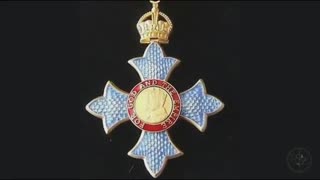 13:56
13:56
Aussie Novax
2 years agoDonald Trump Is a Jesuit Coadjutor
840 -
 27:56
27:56
Degenerate Plays
23 hours ago $3.79 earnedDiagnosed From My Sonic The Hedgehog Fixation? - Batman: Arkham Asylum : Part 17
18.3K -
 1:31
1:31
Damon Imani
3 days agoWhoopi TRASHED Kash Patel’s FBI and Got Calmly DESTROYED by Damon!
23.8K18 -
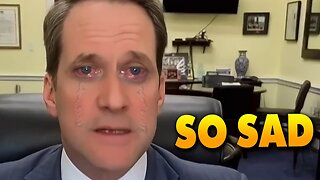 2:06
2:06
Memology 101
12 hours ago $2.33 earnedWON'T SOMEBODY PLEASE THINK OF THE POOR NARCOTERRORINOS?!
22K14 -
 18:43
18:43
Nikko Ortiz
1 day agoWorst Karen Internet Clips...
147K19 -
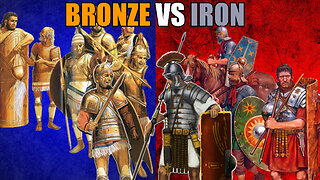 8:39
8:39
MetatronHistory
1 day agoWhy Did We Switch From Bronze to Iron in Classical Antiquity?
31.6K4 -
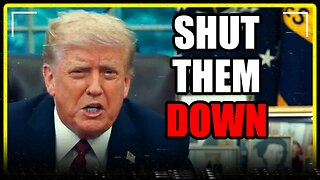 11:01
11:01
MattMorseTV
18 hours ago $19.79 earnedEU caught in $140,000,000 SCANDAL.
44.5K69 -
 1:44:46
1:44:46
PandaSub2000
15 hours agoUltimate Chicken Horse | ULTRA BEST AT GAMES (HD Edited Replay)
27.5K -
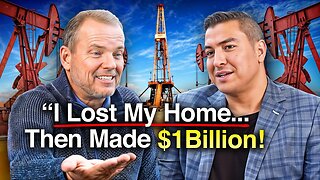 1:47:16
1:47:16
omarelattar
3 days agoTroy Eckard Shares His Rags to Riches Story
28.1K1 -
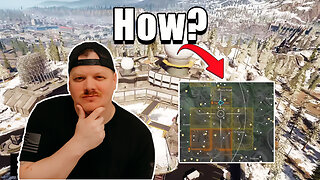 26:18
26:18
GritsGG
18 hours agoHow to Activate Heat Map & Find Self Revives On Warzone!
21.2K